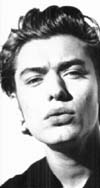|
Jude Law
Enemy at the Gates
Interviewed by James Mottram
What do you think of your character, Vassily?
He is symbolic of Russia at the time, but he is also an everyman
in any time, in any conflict. It's the idea of this individual being
taken from his home and put into a conflict, a war situation where
it's life or death. He transcends the period of the movie and is
as relevant today as he is then. People in the past have been plucked
from their homeland and told to fight for the greater good without
being told what the greater good is. In that sense, Vassily is quite
the essential everyman in battle. His journey from that to become
a soul-sapped war veteran was a hell of a challenge. What preparation
did you do? 
I underwent a lot of training to be an authentic sniper. I studied
camouflage, military approach, and how to handle the weapon, and
then I arrived here, put on the fatigues and realised that none
of that had anything to do with anything. It was good for my brain
but once I got out there and met the young Germans and Russians
who all had stories of their relatives in this battle. You heard
it from the heart, you saw it in their eyes. Then I got used to
the fact that I couldn't feel my fingers and my feet. That for me
was the essence of the battle. It was nothing to do with what the
history books say, whose right or wrong. It was all about people
suffering, really, and the intensity of friendship and relationships,
and love under the strain of war.
Was Vassily really such a sharpshooter?
There was a story in his memoirs that he shot a wolf in the eye
from over half a mile away. He was an incredible marksman. I've
met guys who said that was possible. They could read the wind, the
levitation of the land, how the temperature would affect the speed
of the bullet. An incredible gift, but a fatal gift, a gift that
is turned against him, almost. It was a God-given talent that was
stirred by the Devil. He had to live with the faces of all those
people he killed.
Rachel Weisz
Enemy at the Gates
Interviewed by James Mottram
Why did you do "Enemy at the
Gates"?
It had everything. It's a cliché when female actors say they
can't find strong roles, but it is very hard to find challenging
roles that are different and difficult. It's also a story I didn't
know anything about and that was interesting on an intellectual
level. I thought it was a great role for a young woman. What preparation
did you do?
We read lots of history books and saw documentaries, reportage.
And lots of photographs. There was one incredible image of a woman,
a Russian soldier who was lying asleep on her rifle. Her face is
covered in mud and dirt and she had such a serene expression on
her face. It's such an incredible image. I had it pinned up on my
wall. I didn't know there would be women fighting.
Were you comfortable using a gun?
Not immediately, but I had to learn to be comfortable. I felt my
biggest responsibility on this film was to be believable as a soldier.
I'd never picked up a gun. It's strange at first. In England, the
police don't have guns so we live in a culture where I don't see
guns. We were trained by a military officer and had to load, unload,
clean, fire, pick-up. They're very heavy. I developed big muscles
from carrying it around for five months. It didn't make me feel
very macho.
Were you good at using a gun?
I didn't have to be as good as Jude Law, but apparently - according
to the ex-SAS officer who trained us both - I was a natural. Very
bizarre thing to discover that you're good at, and not something
I'm necessarily proud of. Normally actors are not very coordinated
with guns, I don't know why. I just took to it quickly. Jude then
became better than me, but I was faster.
|
